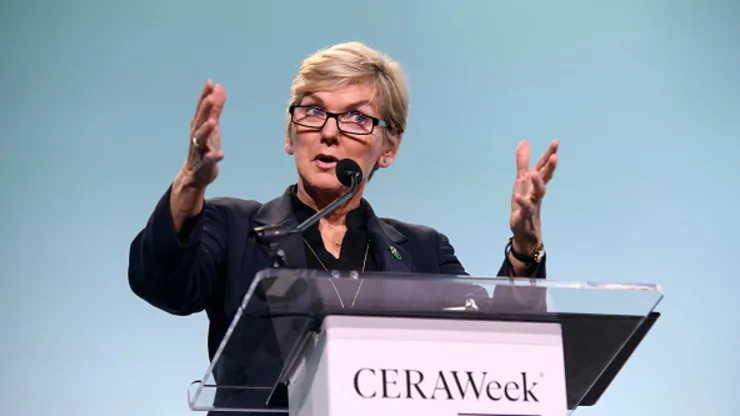
U.S. Energy Secretary tells skeptical executives natural gas export pause will be short-lived
- Energy Secretary Jennifer Granholm indicated this week that a pause on U.S. liquid natural gas exports from new projects would be lifted within a year.
- The Department of Energy announced the pause in January to evaluate the impact of the U.S. LNG boom on the climate, security and domestic prices.
- The U.S. is the largest LNG exporter in the world.
- Oil and gas executives strongly pushed back against the pause during the CERAWeek by S&P Global Energy Conference in Houston.
HOUSTON : The Biden administration this week sought to reassure skeptical oil and gas executives that a pause on liquified natural gas exports from new projects would be short-lived and would not alter the industry’s meteoric growth.
In less than a decade, the U.S. has become the world’s largest LNG exporter as production of the commodity and construction of export terminals has boomed. LNG is natural gas cooled into liquid form to make it easier to transport.
U.S. exports have provided European allies with energy security as they seek to end their dependence on Russian gas in the wake of Moscow’s invasion of Ukraine. Industry executives argue LNG will play a key role in the energy transition by displacing coal for electricity generation.
The Department of Energy announced a pause on exports from new projects in January to evaluate the impact the LNG surge has had on the climate, energy security and domestic prices.
“This pause on new LNG approvals sees the climate crisis for what it is: the existential threat of our time,” President Joe Biden said after the January announcement.
Secretary of Energy Ms. Jennifer Granholm indicated in Houston on Monday that the pause would be relatively short-lived.
“I predict that as we sit here next year … this will be well in the rearview mirror,” Granholm told the CERAWeek by S&P Global energy conference in reference to the LNG export pause.
The energy secretary reiterated the pause has no impact on the 48 billion cubic feet per day that is currently authorized for export. This includes 14 billion cubic feet per day that is currently exported, another 12 Bcf/d under construction and 22 Bcf/d that is authorized but has not received final investment decisions.
The 48 Bcf/d of currently authorized LNG is three times the current export capacity of the U.S., according to the Department of Energy.
Industry pushback
Oil and gas executives and Republican senators, however, were unmoved by Granholm’s remarks, arguing the pause would shake confidence among investors evaluating new projects, rattle allies who depend on U.S. LNG and potentially undermine the transition to cleaner energy sources.
“The pause is climate unfriendly, economically unfriendly, and security unfriendly. There’s no reason to have the pause,” John Hess, the CEO of oil and gas producer Hess Corp., told.
“We can’t flip-flop our policy,” Hess said. “We can do any study we want, but you don’t make a pause, you don’t make a freeze — do the study in parallel,” he said.
Hess said gas will play a key role in the energy transition, particularly in countries like China where coal supplies 60% of electricity generation. “The only way to get those numbers down is to replace it with gas,” the CEO said.

